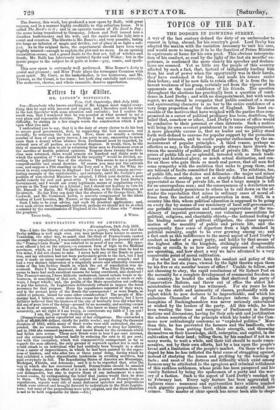Itthr Iii tYt Cahn.
MR. LINGER'S DIFFICULTY.
Trin. Coll. Cambridge, 28th July 1852. Sin—Everybody who knows anything of Mr. Lingen must regard every- thing that he says with interest and respect, and I therefore read his letter in the last Spectator with some attention and curiosity ; but I confess the result was, that I wondered that he was puzzled at what seemed to me a very plain and reasonable doctrine. Perhaps I may assist in removing his difficulty, by stating in a few simple words the construction which I put upon what you said. I understand you to say, that it is the duty of every elector to do his best to secure good government, first, by supporting the best measures, and secondly, by returning the best men. Now, there are usually a certain number of men of each party (never, I am sorry to say, amounting to much more than a dozen) whose absence from Parliament must be regarded, by rational men of all parties, as a national disgrace. It would, then, be the duty of reasonable men to aid in returning these men to Parliament even at the saerifice of hostile political opinions. Suppose these twenty-four first- class men returned, there would remain six hundred and thirty seats in which the question of "who should be the majority" would be decided, ac- cording to the political bias of the electors. This seems to me a perfectly comprehensible and sound doctrine. Of course you may put the extreme case, and suppose a Pitt standing on the Tory and a Fox on the Whig in- terest in every constituency in England: but I fear this will remain an ever- lasting example of the unattainable ; and certainly, until Mr. Carlyle's pro- position of non-elected Ministers be adopted, I think your doctrine a most useful remedy for real and great evils. I have no love for Lord Derby's Government, and I would use every legitimate means of supplanting every private in the Tory ranks by a Liberal; but I should not hesitate to vote for Mr. Disraeli in Bucks, Mr. NValpole at Midhurst, or Sir John Paldngton at Droitwich. No fair Tory can deny that the absence of Sir George Grey, Mr. Cardwell, and Mr. Cornewall Lewis, is scarcely compensated by the silent wisdom of Lord Lovaine, Mr. Turner, or the egregious Mr. Booker. Such I take to be your advice, and such its practical application; and, were such advice more frequently followed, perhaps we should. not be so often reminded by the constituencies of England of the fate of those who "stoned the prophets."


























 Previous page
Previous page